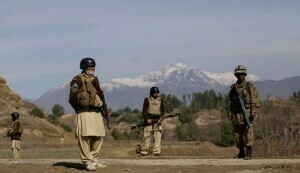PESHAWAR: The Khyber Pakhtunkhwa government has turned down the Peshawar High Court’s proposal for the establishment of child protection courts at district level in the province.
“Pakistan is signatory to the UN Child Rights Convention under which several steps have to be taken for the wellbeing of children. For that reason, we (high court) twice requested the provincial government to set up separate child protection courts at district level but the request was rejected,” PHC registrar Khawaja Wajihuddin told reporters during a briefing here on Thursday.
The registrar said after the successful functioning of the child protection court in Peshawar, the high court was set to establish two such courts in Mardan and Abbottabad, which would begin function this month.
Court registrar says observations about proposed law on judicial services addressed
He said the high court had formally responded to the objections raised by the finance department about the proposed Khyber Pakhtunkhwa Judicial Services Act.
Mr Wajihuddin said the government had returned the proposed law’s draft to the court lately with certain observations.
He said the proposed law, which was meant to completely separate district judiciary from the executive and prescribed a service structure for the staff of the district judiciary, was sent to the government for approval and legislation in Nov 2018 but the government returned it after eight months with certain observations after the issuance of repeated reminders.
Mr Wajihuddin said the Constitution guaranteed the independence of judiciary and the proposed law had the same objective.
He added that the proposed law would also give the legal cover to the Secretariat District Judiciary set up at the high court.
Accompanied by PHC legal draftsman Ahmad Sultan Tareen, member of the inspection team Zubair Khan and the SDJ officers, the registrar gave an overview of the three quarters of the judicial year from Sept 2018 to May 2019 and said the total pendency had been reduced from 204,958 to 192,966 cases in the period at the district level in the province, excluding the newly-merged tribal districts.
“This performance is very encouraging as the same is delivered at the time when merged tribal districts were put on board and cases from there were transferred to regular judicial system,” he said.
The registrar said 362,776 new cases were instituted, while a total of 369,170 cases were disposed of during the period.
Mr Wajihuddin said a major challenge that district judiciary faced was the merging of the erstwhile Fata with KP and that put a strain on human and capital resources required for the NMD, where judicial officers were transferred, which also affected the performance of district judiciary.
“Though facing this challenge, the judicial officers in regular districts performed with average disposal rate of above 100 cases throughout the three quarters, which is a commendable performance,” he said.
About the high court’s performance, the registrar said the total pendency declined from 37,952 to 36,459 cases in three quarters.
He added that a total of 24,734 new cases were instituted, whereas 25,938 were disposed of during the period.
The registrar said the court had given a requisition for the appointment of 120 civil judges and 43 of them had been appointed.
He added that the government was also requested for the appointment of 34 additional district and sessions judges.
The registrar said a total of 5,147 cases were instituted in the merged districts from March to May 2019 with a disposal rate of 1,114 cases.
He said a total of 3,780 cases under the now repealed FCR (Frontier Crimes Regulation) were transferred to regular courts, while 4,121 cases were pending at the end of May 2019.
The registrar said the judicial officers posted to the merged districts lacked transport and other basic facilities.
He said the judicial officers would continue to deliver even if they were not provided with facilities. The registrar added that the court was taking up with the government the issue of creating certain judicial officer posts, including that of senior civil judge (administration) in the seven merged districts.
He said the court had asked the government to set up anti-terrorism courts and consumer courts in the erstwhile Fata.
Ahmad Sultan Tareen, who visited some merged districts lately, said unfortunately, the administrations of those areas were reluctant to hand over assets to other institutions assigned with state functions, including the judiciary.
Published in Dawn, September 6th, 2019
















































Dear visitor, the comments section is undergoing an overhaul and will return soon.